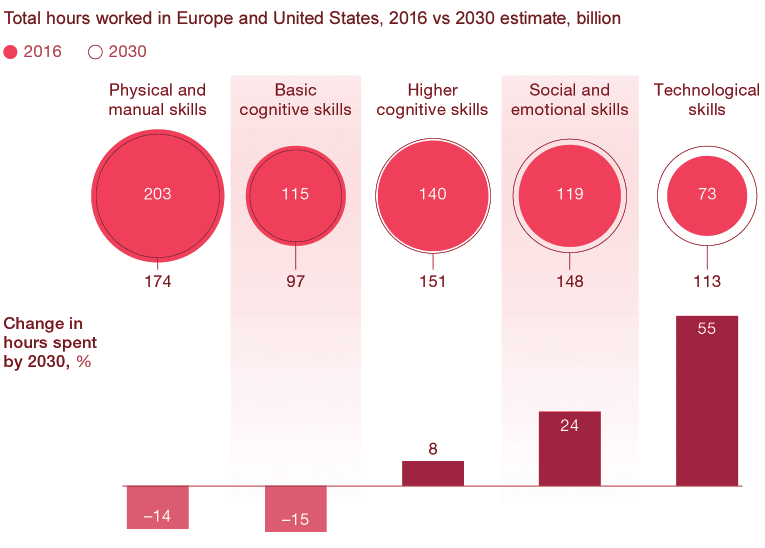Non-STEM Skills Give an Edge to STEM Professionals
Today’s employers want workers who have “soft skills,” such as being a good listener or thinking critically.
Published October 1, 2019
By Pinelopi Kyriazi
Academy Contributor

According to a new report from Cengage, an educational technology and services company, employers want college graduates who have “soft skills,” such as being a good listener or thinking critically, but they have difficulty finding such candidates.
Such so-called “soft” skills are highly sought after by employers, yet they tend to be given short shrift in academic settings. As a result, while science, technology, engineering and mathematics (STEM) professionals receive extensive training on technical skills, their non-STEM skills tend to be underdeveloped.
Nevertheless, a growing body of evidence shows that soft skills are an indicator for future employment and earnings compared to technical and manual skills. Hence, a gap has been created between which skills employers are looking for, and which skills STEM job candidates provide. From running a productive lab to leading a research team, a successful career for scientists hinges on their ability to communicate and collaborate, often with teams that may be in other departments, other institutions or even other countries.
Developing Skills in Persuasive Writing, Management
Take grant writing. Competition for a shrinking pool of funding is fierce, so academic scientists need to tell a cohesive and evidence-based story from complicated data to grab the attention of reviewers and secure funding.
Translating complex content in a simple and easy to understand manner is not a skill frequently practiced until scientists earn their first academic job. By this point, stress is high as job security often rests on their ability to earn grants to continue their research.
Similarly, managing a team of graduate students or post-doctoral trainees is a daunting task for a new professor. On top of all that, many have a heavy teaching load, making their time and project management skills essential to their productivity.

Lotus STEMM
Technical Skills: The Great Decline
A recent report by the McKinsey Global Institute, explored the shifting demand for workforce skills from now until 2030. They found that technological advancements, including automation and artificial intelligence, are changing the types of tasks employees are performing.
As people increasingly interact with machines, there is a greater need for technological skills, social and emotional skills and higher cognitive skills. These include creativity, complex information processing, empathy, critical thinking and communication. People are still outperforming machines on such skills, but machines are generally much better at repetitive tasks with explicit rules requiring physical or manual labor.
The Impact of Automation
Historically, technological advancement has created new types of work while some occupations become outdated. According to the McKinsey report, while the internet eliminated many jobs, new positions emerged in computer programming, application development, social media marketing and search engine optimization.
Science is undergoing a similar pattern, with mundane tasks such as repetitive data collection and replication becoming more dependent on automation. Scientists are improving their technological skills such as coding complex algorithmic models, interpreting multi-dimensional data and managing big data sets.
Social skills are also becoming more prevalent as teamwork and communication required for intricate experiments is growing. Lab sizes are increasing and scientists at various training levels — from undergraduate students to early career researchers — must work together to complete large scale projects.
Scientists in Academia and Industry Possess Many Non-STEM Skills
Graduate training for scientists is heavily focused on acquiring technical skills and scientific acumen. But a vital aspect of scientific research is sharing the knowledge acquired through experimentation in a meaningful and comprehensible manner. Hence communication of scientific data becomes the cornerstone of research.
Joseph Borrello, a PhD candidate and Prototyping Fellow at Sinai Bio-Design at Icahn School of Medicine at Mount Sinai, highlights the need to attend scientific conferences and share his work.
“Part of communication is going to places where you can communicate,” he says, “and knowing that you have something to share even if it is not completed into a polished publication or presentation.”
Conferences are a great way to interact with other scientists, but also attending events for a broader audience can make you a better communicator.
“It is hard to condense everything down into an elevator pitch format,” says Borrello. But he emphasizes that “doing it once is not necessarily enough.” Building up to a confident elevator pitch takes practice and repetition, just like a good science experiment.
Skills in Effective Communication

Nike Sport Research La
Communication doesn’t only include oral presentations. Scientists must master communicating science through writing as well.
Nida Rehmani, who completed her PhD in Biochemistry and M.Ed. in STEM, worked on her writing skills after graduate school as a content/blog editor at Lotus STEMM, a non-profit organization for South Asian women in STEMM (the second M stands for medicine).
“Activities like writing scientific blogs is a great way to develop one of the soft skills and should be inculcated in the next STEM generation,” she says.
Academics are not the only scientists who need excellent communication skills. Those in industry require both scientific and business acumen to get ahead. Savitri Sharma, a biochemist leading the Apparel Research division of Nike Sport Research Lab, emphasizes that scientists need to develop their story-telling skills; especially when sharing results with team members of different backgrounds.
“Bottom line up front,” she says, “being able to connect your work straight to what is happening at the company will set you apart.”
It’s important to grab the audience’s attention and communicate why someone should care. Additionally, she underscores that what sets scientists apart in business, is that they can dive into the details when needed.
“Don’t shy away from being the expert that you are, don’t feel embarrassed or ashamed, be proud,” she says.
The Power of Networking
Another important non-STEM skill is networking. Regularly attending both external and internal conferences, receptions and symposia can help scientists improve their research by making new connections leading to collaborations. As Borrello explains, networking is a stochastic process and can feel awkward at first.
“All the rules of chemistry and chemical reactions that apply to solutions, apply to people also,” he says. “Sometimes the randomness in networking can enable positive relationships to develop. The only way to meet a new collaborator or connect with a potential employer is by attending many networking opportunities and speaking up.”
In industry, networking plays an important role in advancing your career. Sharma leveraged this skill to land her current role as a researcher at Nike. Further she emphasized this as one of the essential skills for her mentees during her tenure as Chair of Women of STEM network at Nike.
After working in various business functions, she declared her intent to pursue a career in research and development at one of the events. As a result of a connection she made, one of the other attendees helped her apply for the position. Navigating large organizations is difficult, but effective networking skills can ameliorate the stress and propel your scientific career forward.
Other “Soft” Skills
Other soft skills include time and project management, team work, listening and social skills. Many of these are often underestimated, but they are all important elements in today’s work environment and can give you an edge to land the job of your dreams.
“Understanding your own potential and skills is important in time management,” says Rehmani.
Knowing and articulating your value can make a difference in the productivity of a lab or a team setting. Scientists already possess many of these skills — continually refining and practicing them will help researchers to become more valued employees, and, as a result, advance their careers.
Automation and Artificial Intelligence Will Accelerate the Shift in Skills that the Workforce Needs

Source: McKinsey Global Institute Workforce Skills Model; McKinsey Global Institute analysis
